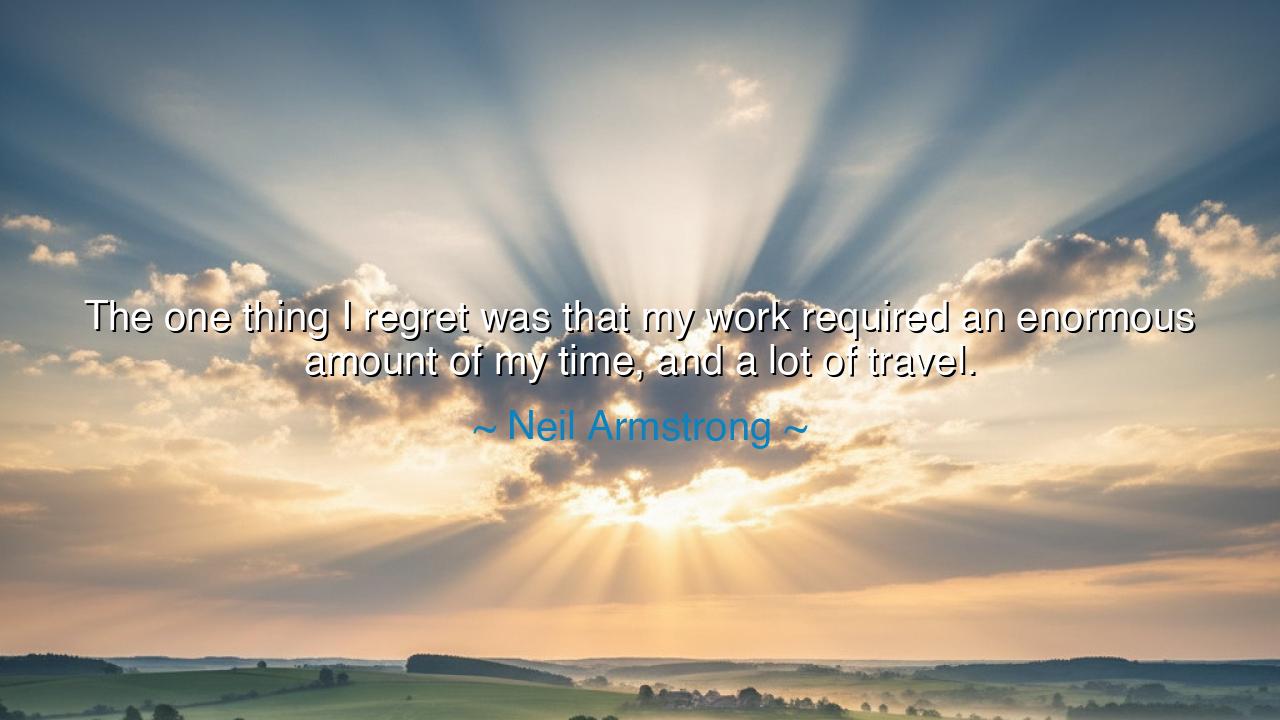
The one thing I regret was that my work required an enormous
The one thing I regret was that my work required an enormous amount of my time, and a lot of travel.






In the words of Neil Armstrong: “The one thing I regret was that my work required an enormous amount of my time, and a lot of travel.” These words, spoken by the first man to set foot upon the moon, are not a complaint of weariness but a whisper of sorrow from a life lived under the weight of destiny. For Armstrong, who carried the hopes of nations and touched the very dust of heaven, still felt the cost of his calling—the hours surrendered, the journeys that took him far from home, and the time that could never be returned to those he loved.
The origin of these words lies in the nature of greatness itself. To achieve what no human had achieved before required total devotion: training that consumed the body, calculations that stretched the mind, and voyages that carried him across the earth long before they carried him to the stars. In the pursuit of such monumental work, Armstrong bore the same burden that has haunted all who chase history: the sacrifice of time. Heroes often give their lives to their mission, but just as often, they give the quieter, heavier offering—their hours, their presence, their nearness to family and friends.
This truth has echoed throughout history. Consider Alexander the Great, who conquered nations yet lamented in his later years that he had no time to enjoy the simple peace of home. Or Marcus Aurelius, emperor of Rome, who ruled with wisdom but spent his life traveling from battlefront to battlefront, longing for the quiet gardens of philosophy. Like Armstrong, they carried the crown of achievement, but it was weighted with absence. Greatness often demands not only bold deeds but also the surrender of life’s gentler joys.
Armstrong’s words are particularly poignant because they reveal the humanity behind the legend. The world saw him step onto the lunar surface, but his children saw a father gone on endless missions. The world celebrated his travels across nations, but his family felt the silence of his empty chair. His regret teaches us that even in the most glorious triumphs, there is always a cost. To touch the stars is to leave behind something precious on earth.
Yet Armstrong’s confession is not a message of despair—it is a gift of wisdom. He reminds us that the measure of a life is not only in what one accomplishes but in how one balances work with love, duty with presence. We may not all walk upon the moon, but many of us know the same temptation: to give so much to our work that our families and our souls are left with too little. His regret is a warning spoken gently across time: do not lose what is most irreplaceable in the pursuit of what is most impressive.
The lesson for us is clear: guard your time as fiercely as your ambition. Work with diligence, but remember that the hours you spend with loved ones are treasures beyond gold. No achievement, however vast, can replace the warmth of presence, the laughter of family, the peace of home. If you must travel, return not only with stories but with renewed commitment to those who waited. If you must work long, let it not be always, lest you discover too late that the world gained your triumph but your heart lost its rest.
Thus, Neil Armstrong’s words endure not as bitterness but as a sacred counsel. Greatness requires sacrifice, but wisdom seeks balance. Let each of us strive for the stars in our own way, but let us also remember to cherish the earth beneath our feet and the people who walk it with us. For in the end, it is not only what we achieve, but whom we love and how we spend our fleeting time, that will echo through eternity.






AAdministratorAdministrator
Welcome, honored guests. Please leave a comment, we will respond soon